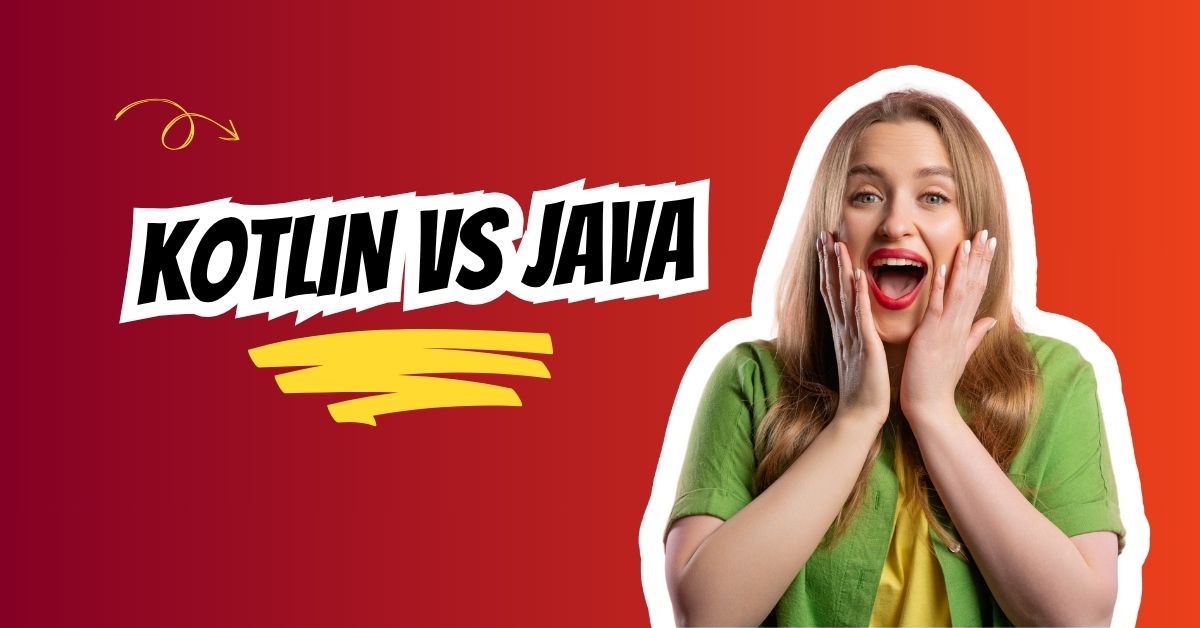Kotlin vs Java: Which One is Better for Android App Development?

Android app development has seen significant evolution over the years, especially when it comes to the choice of programming languages. Two names that consistently dominate the landscape are Kotlin and Java. While Java has a legacy of over two decades, Kotlin has emerged as a modern and developer-friendly alternative endorsed by Google itself. With both languages having distinct features and capabilities, the question that persists is: Which one is better for Android app development—Kotlin or Java?
In this comprehensive guide, we’ll explore the differences, advantages, disadvantages, use cases, and performance factors of both Kotlin and Java, helping businesses and developers make an informed decision. Whether you are a startup looking for custom Android app development services or an enterprise planning to migrate your legacy system, this article is your go-to resource.
The Rise of Kotlin and the Legacy of Java
Java: The Veteran of Android Development
Java has been the foundational language for Android since the platform’s inception in 2008. Known for its simplicity, scalability, and cross-platform capabilities, Java quickly became the go-to language for Android app development. It benefits from robust documentation, a massive community, and a plethora of libraries and tools. Many top-tier apps like Twitter and Spotify have their backend or Android components written in Java, thanks to its reliability and scalability.
Numerous Java development companies still rely on it due to its proven track record in large-scale enterprise applications.
Kotlin: The Modern Contender
Kotlin was officially announced as an Android-supported language by Google in 2017. Developed by JetBrains, the creators of IntelliJ IDEA, Kotlin was designed to interoperate fully with Java while offering concise syntax and improved safety features. Kotlin has rapidly gained popularity, particularly among startups and teams looking for increased productivity and fewer runtime crashes.
As a result, demand for Kotlin development services has surged as businesses aim to leverage the modern features of the language to build robust and efficient Android applications.
Key Differences Between Kotlin and Java
Let’s delve into the key differences that separate Kotlin from Java in the Android development world:
| Feature | Java | Kotlin |
| Syntax | Verbose | Concise and expressive |
| Null Safety | Prone to NullPointerExceptions | Built-in null safety |
| Lambda Expressions | Available since Java 8 | Native and more intuitive |
| Extension Functions | Not supported | Fully supported |
| Coroutines Support | Limited | Native support for async programming |
| Compilation Speed | Faster | Slightly slower due to new features |
| Interoperability | Compatible with Kotlin | Fully interoperable with Java |
Kotlin Advantages for Android App Development
1. Concise Code, Fewer Bugs
Kotlin’s syntax is more compact and expressive than Java, reducing the amount of boilerplate code significantly. This not only speeds up development but also makes the code easier to maintain and less error-prone. It’s particularly beneficial for teams offering custom Android app development services, where faster turnaround times are crucial.
2. Null Safety
One of Kotlin’s most touted features is null safety. Kotlin’s type system is designed to eliminate the notorious NullPointerException, which is a common source of crashes in Java-based applications. This makes Kotlin-based apps more stable and secure.
3. Coroutines for Better Performance
Kotlin has built-in support for coroutines, which simplifies asynchronous programming. It enables developers to handle long-running tasks like network operations or database access efficiently, without blocking the main thread. This leads to smoother app performance and improved user experience.
4. Smart Casts and Type Inference
With smart casting, Kotlin automatically handles type conversions, reducing the need for explicit casts. Combined with type inference, this feature allows developers to write cleaner and more readable code, ultimately reducing bugs.
Java Advantages for Android App Development
1. Mature Ecosystem and Community
Java has a massive community and a rich ecosystem of libraries, frameworks, and tools. Its longevity and widespread use mean that developers have access to extensive resources, third-party tools, and support. For large enterprises and Java development companies, this is a critical factor.
2. Platform Independence
Java’s core strength lies in its “write once, run anywhere” principle. Applications developed in Java can run on multiple platforms without modification, making it ideal for businesses that need cross-platform capabilities.
3. Performance and Speed
Although Kotlin has caught up in many aspects, Java still has the edge when it comes to compilation speed and runtime performance in certain cases. This can be crucial in apps that demand high performance and low latency.
4. Strong IDE and Tooling Support
Java is well-supported by Android Studio, Eclipse, IntelliJ IDEA, and other top-tier IDEs. Developers can also use a vast array of debugging, testing, and optimization tools specifically tailored for Java-based applications.
Use Cases: When to Choose Kotlin vs Java
When to Choose Kotlin
- You want to build modern, scalable Android applications with fewer bugs.
- You are aiming for shorter development cycles with cleaner code.
- Your app relies heavily on asynchronous tasks or real-time data handling.
- You’re working with a team offering Kotlin development services.
- Your goal is to future-proof your app with Google-recommended technology.
When to Choose Java
- You’re maintaining or upgrading a legacy Android app built in Java.
- Your development team has more expertise in Java.
- You’re working on enterprise-grade applications that demand stable, time-tested technology.
- You want to integrate with large-scale systems already using Java-based services.
Business Implications: Cost, Talent, and Productivity
Development Cost
The choice of language can impact the cost of development. Kotlin developers might demand a slightly higher rate due to the language’s rising popularity and modern features. However, Kotlin’s concise syntax can lead to shorter development cycles, potentially balancing out the initial cost.
Talent Availability
Java developers are more widely available in the market due to its long-standing presence. However, Kotlin is rapidly becoming the preferred language among new-age developers, and many custom Android app development services firms are retraining their teams accordingly.
Productivity Gains
Kotlin offers numerous features that improve developer productivity, such as extension functions, coroutines, and null safety. This results in faster project delivery, fewer bugs, and easier maintenance in the long run.
Google’s Support for Kotlin
In 2019, Google announced Kotlin as the preferred language for Android development. This move underscored Kotlin’s growing significance in the Android ecosystem. Today, many official Android libraries and Jetpack components are either written in Kotlin or optimized for it.
This backing from Google gives businesses and developers confidence in choosing Kotlin as a long-term solution.
Real-World Adoption Examples
Kotlin in Action
- Pinterest transitioned from Java to Kotlin and reported increased developer happiness and productivity.
- Trello used Kotlin to rewrite parts of its Android app and saw better maintainability.
- Many custom Android app development services firms use Kotlin as their default language for new projects.
Java in Enterprise Systems
- LinkedIn, Spotify, and Twitter continue to rely on Java for parts of their Android and backend systems due to its scalability.
- Banks and insurance firms work closely with Java development companies for robust and high-performance mobile solutions.
Migration from Java to Kotlin: Things to Consider
If you’re considering migrating your existing app from Java to Kotlin, here are a few points to keep in mind:
- Interoperability: Kotlin and Java can co-exist within the same codebase, enabling gradual migration.
- Learning Curve: While Kotlin is relatively easy to learn for Java developers, training and onboarding still require investment.
- Tooling and Testing: Ensure all tools and libraries used in the Java ecosystem are compatible with Kotlin to avoid integration issues.
Most Kotlin development services offer migration support and testing strategies to make this transition seamless.
Kotlin vs Java: Performance Metrics
Performance in mobile development isn’t just about speed—it also includes memory efficiency, startup time, UI responsiveness, and background task handling.
- Kotlin’s coroutines make background task management efficient, improving overall responsiveness.
- Java’s Just-In-Time (JIT) compiler offers impressive runtime performance for compute-intensive tasks.
- Kotlin’s additional abstractions may slightly impact compilation speed but don’t necessarily translate into slower runtime.
In most practical applications, both languages perform comparably for typical Android use cases.
Security and Stability
Kotlin’s null safety directly reduces the risk of NullPointerExceptions, one of the most common causes of Android app crashes. This makes Kotlin apps inherently more stable and secure.
Java’s verbose nature requires developers to be more cautious, which can lead to inconsistent coding practices unless rigorously enforced.
If security and crash-free performance are priorities, Kotlin takes a clear lead here.
The Verdict: Kotlin or Java?
There is no one-size-fits-all answer. The decision between Kotlin and Java depends on your business goals, team expertise, project complexity, and long-term plans.
- Choose Kotlin if you are starting a new project, want cleaner code, faster delivery, and fewer bugs.
- Stick with Java if you’re working with legacy systems or require ultra-high performance for complex backend logic.
For businesses looking for cutting-edge innovation, Kotlin presents a strategic advantage. But for those valuing reliability and established processes, Java remains a solid choice.
Conclusion
Both Kotlin and Java are powerful tools for Android app development. Kotlin’s modern features, Google’s backing, and enhanced safety make it an appealing choice for startups and forward-thinking businesses. On the other hand, Java’s maturity, reliability, and widespread adoption continue to make it a mainstay for large-scale enterprise applications.
When evaluating custom Android app development services, consider the nature of your project and the expertise of the development team. Whether you partner with a Kotlin development service provider or a Java development company, the success of your app ultimately depends on strategic planning, efficient execution, and continuous improvement.






